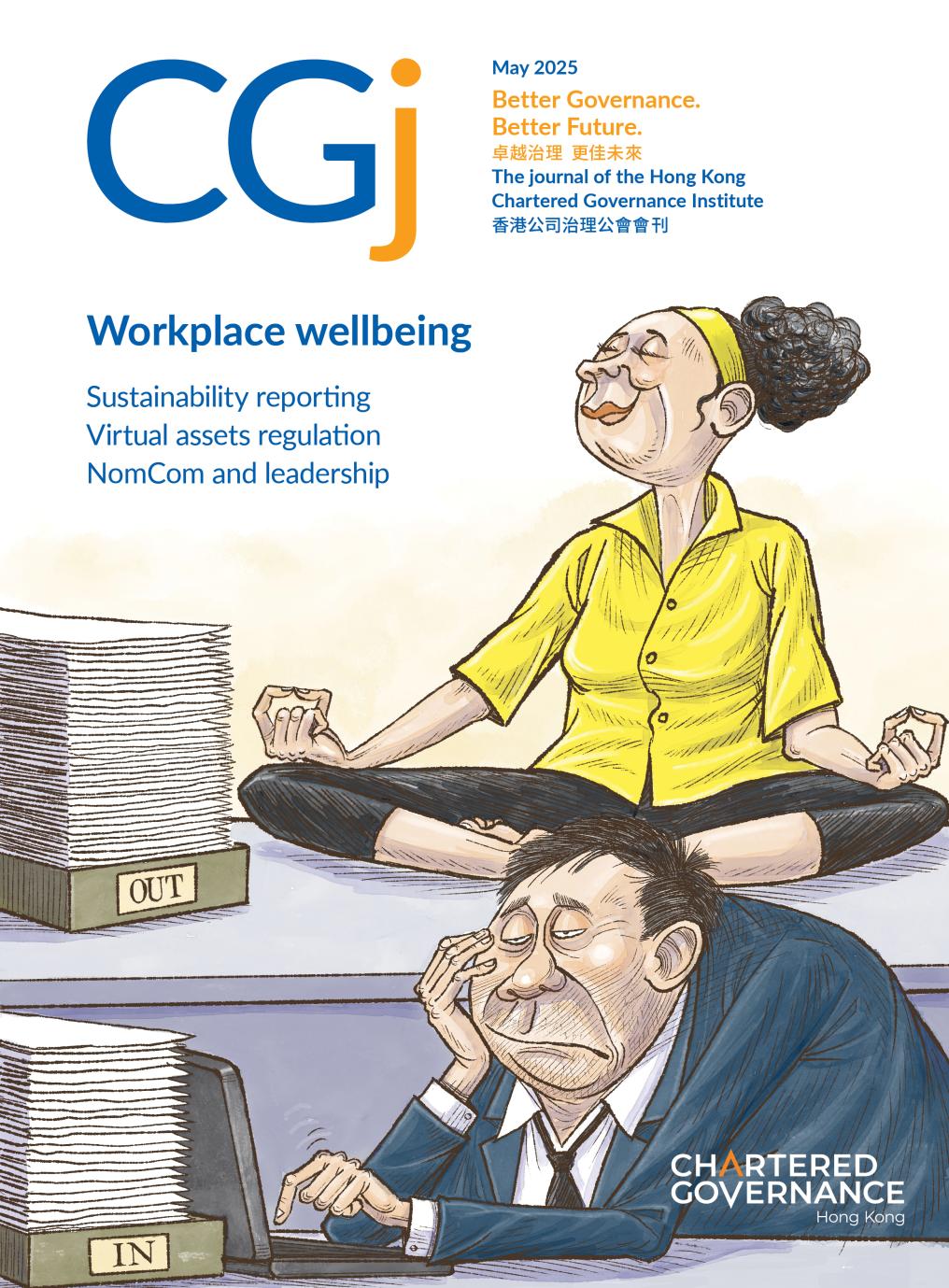
Overview of recent Institute guidance notes
CGj presents a brief synopsis of the Institute’s latest guidance notes from the first quarter of 2025, covering a wide range of topics from distressed deals to competition law updates.
Highlights
- the Institute’s latest guidance notes offer governance professionals practical insights on distressed deals, competition law, AI governance and A+H share company reporting
- governance professionals are encouraged to include risk mitigation strategies for distressed transactions, compliance measures for competition law enforcement and ethical considerations for AI use
- key recommendations include staying informed of evolving regulatory landscapes and adopting best practices to enhance transparency, risk management and compliance
As a vital part of its thought leadership and professional development initiatives, the Institute regularly publishes guidance notes to keep governance professionals and practitioners in Hong Kong and the Chinese mainland updated on the latest advances in governance, risk and compliance. In the first quarter of 2025, the Institute issued guidance notes addressing the following:
- distressed deals
- annual report preparation timeline and key issues for A+H share companies
- ethical and technological perspectives on the use of AI in today’s digital age, and
- a review of competition law updates in 2024.
Distressed deals
The latest guidance note issued by the Institute’s Takeovers, Mergers and Acquisitions Interest Group, titled Distressed Deals, is a three-part publication that provides governance professionals with insights into the legal and governance considerations in such transactions.
Part one of the guidance note focuses on opportunistic buyers seeking to acquire businesses or assets at discounted prices. These deals often involve distressed sellers who require urgent liquidity, which means transactions must be executed quickly. ‘Speed is often critical in distressed deals as sellers may need cash urgently,’ the guidance note warns, stressing that due diligence is vital in distressed deals.
‘Distressed sellers represent higher credit risks because of their financial position, the risks of warranty, indemnity, and other claims on them and the businesses or assets they seek to sell. It is particularly important to flush out issues via due diligence so that the buyer can address them properly, for instance, through deal structuring and/or pricing,’ the guidance note explains.
However, even with a streamlined and focused due diligence exercise, buyers could still sometimes be compelled to put forward bids without full clarity on the potential legacy issues lurking in the target. To mitigate risks, the guidance note suggests defensive measures such as escrow or retention mechanisms, where a portion of the purchase price is withheld until warranties or indemnities are satisfied. It also suggests ring-fencing, where distressed assets are hived down into a newly incorporated company to reduce exposure to unknown liabilities.
Part two of the guidance note shifts to insolvency-related risks, starting with insolvency clawbacks. Governance professionals must be aware that transactions made by distressed sellers could be unwound under law in certain circumstances. The guidance note highlights the risk of transactions when a company sells assets for significantly less than market value. Under Hong Kong law, such transactions can be reversed if they took place within five years of the company’s insolvency. Buyers are advised to seek independent valuations to confirm fair market pricing and ensure compliance with safe harbour provisions, which require documentation proving that the transaction was executed in good faith and for the benefit of the company. ‘In any event, the price discovery needs to be detailed and proper records must be kept,’ it says.
Another key risk highlighted in the guidance note is unfair preference, where a company grants preferential treatment to certain creditors before liquidation. Transactions favouring connected parties within two years, or other creditors within six months, could be subject to clawback. The guidance note advises buyers to conduct due diligence on past transactions and to review board minutes for evidence of commercial rationale.
Part three examines the issue of distressed deals from the seller’s perspective, outlining the challenges of achieving the highest sale price while minimising residual risks. The guidance note acknowledges that distressed sellers often prefer auction processes to maximise value and fulfil fiduciary duties, but these processes can be public in nature and, if unsuccessful, may further exacerbate the ‘distress blight’. Some sellers may opt for expedited auctions or direct negotiations with strategic buyers who have industry knowledge and can expedite due diligence.
Sellers also aim to avoid deal conditions that could delay or derail transactions. The guidance note remarks that ‘sellers in distressed deals will wish to avoid any deal conditions in favour of simultaneous signing and completion’ and encourages pre-signing commitments, such as secured acquisition financing. Where conditions precedent are unavoidable, sellers should ensure they are ‘worded clearly and narrowly’ with defined termination rights and, if necessary, reverse break fees.
Governance professionals must ensure that distressed deals are executed with proper risk assessments and governance oversight. ‘At the end of the day, there needs to be a willing buyer and a willing seller for the conclusion of the deal,’ the guidance note states.
governance professionals must ensure that distressed deals are executed with proper risk assessments and governance oversight
Annual report preparation timeline for A+H share companies
The Institute, in collaboration with Tianyuan Law Firm, published a Chinese-language guidance note in February, titled Annual Report Preparation Timeline and Key Issues Analysis for A+H Share Companies. This guidance note aims to help A+H share companies better understand and address the differences in regulatory rules between the two jurisdictions of Hong Kong and the Chinese mainland, as well as to provide practical references for the annual report compilation work.
The guidance note emphasises the importance of aligning with regulatory requirements in both Hong Kong and the Chinese mainland. A+H share companies must closely monitor the need to publish annual results forecasts, performance briefings or profit warnings/alerts based on progress in financial settlement and auditing. For instance, according to mainland regulations, annual results forecasts must be disclosed within one month after the fiscal yearend, but if the company has already disclosed a forecast in Hong Kong, separate profit warnings/alerts in the Chinese mainland may not be necessary. Additionally, Shanghai and Shenzhen Main Board–listed companies meeting certain financial criteria are exempt from disclosing annual forecasts.
The guidance note points out that A+H share companies are required to publish their H share annual results announcements by the end of March and to complete both A share and H share annual reports by the end of April. To meet these deadlines, companies must synchronise disclosures across both jurisdictions and ensure timely preparation of financial statements. Board meeting announcements and dividend distribution details must also be communicated in advance if the company intends to declare annual dividends.
In addition, the guidance note underscores the essential role of annual reports as a key communication tool for shareholders and investors. Annual reports should provide detailed disclosures on financial performance, operational updates and future outlook. Companies are cautioned to consult professional advisers to ensure compliance with evolving regulatory and disclosure requirements, delivering transparent, targeted and comprehensive information to the market.
Ethical use of AI
The latest guidance note jointly issued by the Institute’s Ethics, Bribery and Corruption Interest Group and the Technology Interest Group, titled Ethical and Technological Perspectives on AI Use Concerns in Today’s Digital Age, provides governance professionals with practical insights into managing AI-related governance risks. It examines ethical challenges arising from AI applications, particularly in data privacy, misinformation and cybersecurity.
The guidance note highlights how AI’s reliance on large datasets raises significant privacy concerns, including the risk of data breaches, unauthorised access and improper use of sensitive information. Recent cases, such as the Facebook–Cambridge Analytica data scandal, point out the regulatory and reputational consequences of failing to address these issues.
The guidance note also warns that AI-powered assistants that offer convenience by automating tasks and providing personalised recommendations, such as Siri and Cortana, often store user interactions, raising concerns about potential misuse or unauthorised access to sensitive information. For instance, Microsoft’s Recall function, which captures screenshots of user activity, has sparked debate about transparency and user control over stored data.
Further, the guidance note highlights real-world examples, such as Air Canada’s virtual chatbot, which misinformed a customer about a bereavement discount, leading to a legal dispute. As AI technology advances, cybercriminals are also exploiting it for more sophisticated attacks. The guidance note cites a recent deepfake scam in which fraudsters impersonated a multinational company’s CFO in a video call, deceiving an employee into transferring US$25 million.
To mitigate AI-related risks, the guidance note identifies best practices for governance professionals. Key recommendations include deploying AI models on secure, in-house infrastructure to protect proprietary data, enforcing strict data governance policies and regularly auditing AI outputs for accuracy. Additionally, organisations should develop clear disclaimers for AI-generated content, conduct due diligence on third-party AI vendors and establish cybersecurity measures such as encryption and employee training.
Competition law
The latest guidance note issued by the Institute’s Competition Law Interest Group, titled 2024 in Review, is a two-part publication that provides governance professionals with insights into key competition law developments and enforcement trends over the past year.
Part one of the guidance note focuses on dawn raids, which saw a significant rise in 2024 as the Hong Kong Competition Commission (Commission) ramped up investigations into hardcore cartel conduct. ‘Continuing its efforts from 2023, the Commission significantly increased the number of dawn raids it conducted this year. These operations have also grown in scale, often executed simultaneously at multiple locations, lasting over a day. Notably, all the Commission’s publicised raids in 2024 were conducted in collaboration with other agencies or with their assistance,’ the guidance note states.
To mitigate risks, governance professionals are urged to prepare for dawn raids by establishing clear protocols and ensuring legal representation is readily available. ‘Train your staff – make sure they understand and are familiar with your dawn raid protocols,’ the guidance note advises, emphasising the importance of compliance training and emergency response measures. ‘Establish emergency contacts with suitable external counsel well in advance.’
Part two of the guidance note concentrates on the Competition Tribunal’s activities in 2024, which saw multiple trials and significant rulings shaping Hong Kong’s competition law landscape. One landmark case was the Multisoft proceedings, where the Tribunal granted relief under Rule 76 of the Competition Tribunal Rules for the first time.
Looking ahead, the guidance note anticipates heightened enforcement activity in 2025, particularly in the technology sector. ‘As the Competition Ordinance enters its 10th anniversary, we expect the Commission to intensify its enforcement activities, with a particular focus on the information technology sector, where the Commission currently has the greatest number of ongoing cases, either under initial assessment or investigation,’ the guidance note predicts.
The guidance notes covered in this article are available in the Thought Leadership section of the Institute’s website: www.hkcgi.org.hk.
Guidance note roundup
The HKCGI guidance notes published in the first quarter of 2025 are set out below. The Institute would like to thank everyone involved in their production.
February
Distressed Deals (Parts 1, 2 and 3). This three-part guidance note, issued by the Institute’s Takeovers, Mergers and Acquisitions Interest Group (10th, 11th and 12th issues), was authored by Lisa Chung, Partner, Slaughter and May. The Takeovers, Mergers and Acquisitions Interest Group members are Michelle Hung FCG HKFGG (Chairman), Dr David Ng FCG HKFCG, Henry Fung, Kelvin Tam, Lisa Chung, Patrick Cheung and Philip Pong.
Annual Report Preparation Timeline and Key Issues Analysis for A+H Share Companies. This Chinese-language guidance note, designed to assist A+H share companies better understand and address the differences in regulatory rules between the two jurisdictions of Hong Kong and the Chinese mainland, was published in collaboration with Tianyuan Law Firm.
Ethical and Technological Perspectives on AI Use Concerns in Today’s Digital Age. This joint Ethics, Bribery and Corruption Interest Group and Technology Interest Group guidance note (14th/16th issue) was authored by William Tam ACG HKACG, Partner, Deloitte China, with contributions from Dylan Williams FCG HKFCG, Chairman, Technology Interest Group. The Institute’s Ethics, Bribery and Corruption Interest Group members are Dr Brain Lo FCG HKFCG (Chairman), Cynthianna Yau, Mary Lau, Michael Chan, Ralph Sellar and William Tam ACG HKACG. The Institute’s Technology Interest Group members are Dylan Williams FCG HKFCG (Chairman), Ricky Cheng, Harry Evans, Gabriela Kennedy and Philip Miller FCG HKFCG.
March
2024 in Review (Parts 1 and 2). The Institute’s Competition Law Interest Group issued a two-part guidance note (16th and 17th issues) to update governance professionals on competition law developments and enforcement activities during 2024. This was authored by Natalie Yeung, Partner, and Yvonne Ngai, Senior Legal Assistant, Slaughter and May. The Competition Law Interest Group members are David Simmonds FCG HKFCG (Chairman), Adelaide Luke, Alastair Mordaunt, Brian Kennelly QC, Mike Thomas and Natalie Yeung.
The Institute would also like to thank Michael Ling FCG HKFCG, Chairman of the Institute’s Technical Consultation Panel, for his oversight of the Institute’s guidance notes, and Mohan Datwani FCG HKFCG(PE), Institute Deputy Chief Executive, who serves as Secretary of the Institute’s Interest Groups and is Contributing Editor of the Institute’s guidance notes.
Comments and suggestions are welcome, and should be sent to: mohan.datwani@hkcgi.org.hk.


